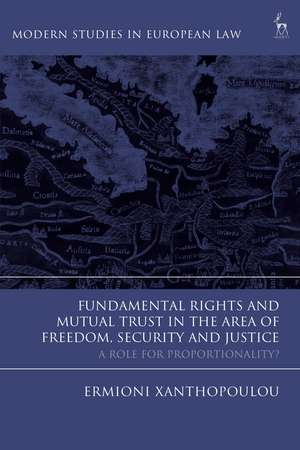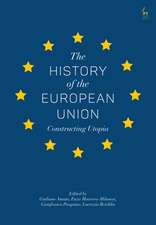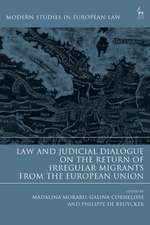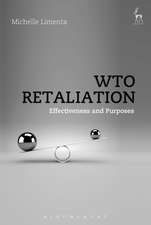Fundamental Rights and Mutual Trust in the Area of Freedom, Security and Justice: A Role for Proportionality?: Modern Studies in European Law
Autor Ermioni Xanthopoulouen Limba Engleză Hardback – 29 apr 2020
Din seria Modern Studies in European Law
- 30%
 Preț: 575.75 lei
Preț: 575.75 lei - 24%
 Preț: 440.21 lei
Preț: 440.21 lei - 31%
 Preț: 594.77 lei
Preț: 594.77 lei - 30%
 Preț: 570.22 lei
Preț: 570.22 lei -
 Preț: 181.55 lei
Preț: 181.55 lei - 30%
 Preț: 541.93 lei
Preț: 541.93 lei - 30%
 Preț: 507.97 lei
Preț: 507.97 lei - 30%
 Preț: 790.77 lei
Preț: 790.77 lei - 34%
 Preț: 509.45 lei
Preț: 509.45 lei - 30%
 Preț: 511.64 lei
Preț: 511.64 lei - 19%
 Preț: 296.91 lei
Preț: 296.91 lei - 30%
 Preț: 571.34 lei
Preț: 571.34 lei - 19%
 Preț: 296.72 lei
Preț: 296.72 lei - 11%
 Preț: 375.73 lei
Preț: 375.73 lei - 30%
 Preț: 539.57 lei
Preț: 539.57 lei - 30%
 Preț: 595.65 lei
Preț: 595.65 lei - 27%
 Preț: 475.10 lei
Preț: 475.10 lei - 30%
 Preț: 572.80 lei
Preț: 572.80 lei - 30%
 Preț: 721.14 lei
Preț: 721.14 lei - 18%
 Preț: 320.53 lei
Preț: 320.53 lei - 18%
 Preț: 321.66 lei
Preț: 321.66 lei - 30%
 Preț: 600.57 lei
Preț: 600.57 lei - 19%
 Preț: 317.21 lei
Preț: 317.21 lei - 30%
 Preț: 571.34 lei
Preț: 571.34 lei -
 Preț: 464.01 lei
Preț: 464.01 lei -
 Preț: 239.77 lei
Preț: 239.77 lei - 30%
 Preț: 538.03 lei
Preț: 538.03 lei - 23%
 Preț: 418.50 lei
Preț: 418.50 lei - 29%
 Preț: 587.97 lei
Preț: 587.97 lei - 30%
 Preț: 774.62 lei
Preț: 774.62 lei - 30%
 Preț: 570.43 lei
Preț: 570.43 lei - 30%
 Preț: 574.10 lei
Preț: 574.10 lei - 28%
 Preț: 495.80 lei
Preț: 495.80 lei - 30%
 Preț: 575.33 lei
Preț: 575.33 lei - 30%
 Preț: 571.24 lei
Preț: 571.24 lei - 30%
 Preț: 510.34 lei
Preț: 510.34 lei - 20%
 Preț: 219.19 lei
Preț: 219.19 lei - 30%
 Preț: 601.69 lei
Preț: 601.69 lei - 30%
 Preț: 513.60 lei
Preț: 513.60 lei - 18%
 Preț: 305.72 lei
Preț: 305.72 lei - 30%
 Preț: 972.83 lei
Preț: 972.83 lei - 30%
 Preț: 515.24 lei
Preț: 515.24 lei - 30%
 Preț: 539.99 lei
Preț: 539.99 lei - 30%
 Preț: 570.83 lei
Preț: 570.83 lei - 30%
 Preț: 571.82 lei
Preț: 571.82 lei - 29%
 Preț: 554.35 lei
Preț: 554.35 lei - 30%
 Preț: 572.06 lei
Preț: 572.06 lei - 13%
 Preț: 258.15 lei
Preț: 258.15 lei - 30%
 Preț: 574.59 lei
Preț: 574.59 lei
Preț: 539.99 lei
Preț vechi: 773.79 lei
-30% Nou
Puncte Express: 810
Preț estimativ în valută:
103.33€ • 108.10$ • 85.83£
103.33€ • 108.10$ • 85.83£
Carte tipărită la comandă
Livrare economică 02-16 aprilie
Preluare comenzi: 021 569.72.76
Specificații
ISBN-13: 9781509922253
ISBN-10: 1509922253
Pagini: 248
Dimensiuni: 156 x 234 mm
Greutate: 0.52 kg
Editura: Bloomsbury Publishing
Colecția Hart Publishing
Seria Modern Studies in European Law
Locul publicării:London, United Kingdom
ISBN-10: 1509922253
Pagini: 248
Dimensiuni: 156 x 234 mm
Greutate: 0.52 kg
Editura: Bloomsbury Publishing
Colecția Hart Publishing
Seria Modern Studies in European Law
Locul publicării:London, United Kingdom
Caracteristici
Offers innovative analytical framework to assess whether proportionality has a role to play in field
Notă biografică
Ermioni Xanthopoulou is Lecturer in Law at Brunel Law School.
Cuprins
1. Mutual Recognition: From Passive to Active Recognition IntroductionOverview of the Area of Freedom, Security and Justice Origins of Mutual Recognition Transfer of Mutual Recognition to the Area of Freedom, Security and Justice Typology and Operation of Mutual Recognition Development of Mutual Recognition Models of Mutual Recognition From a Passive to an Active Model of Mutual Recognition Seeking Equivalence and a Role for Proportionality? Conclusion 2. Mutual Trust: From Blind to Gained Trust IntroductionMutual Trust in the Framework Decision on the European Arrest Warrant Mutual Trust in the Dublin III Regulation Evolution of Trust Blind Trust The FDEAW Dublin SystemQualified System of Trust Trust Based on Individual Assessment? Age of Distrust? Brexit and Distrust Rule of Law Crisis and Mutual Trust ECtHR Threshold: Flagrant Denial of Justice Criticism and Commentary Grounds for Pragmatic Earned Trust Conclusion 3. Deconstructing Proportionality IntroductionEarly Philosophical Foundations Emergence of a Legal Doctrine Structure of the Proportionality-based Analysis Legitimate Objective Suitability and Necessity Challenges and Limits Proportionality in EU Law Conclusion 4. The Quest for Balancing in the AFSJ Case Law: Needle in a Haystack IntroductionProtection of Victims in Criminal Proceedings Case Law European Arrest Warrant Case Law Kozlowski; I.B. Leyman; Wolzenburg Lopes Da SilvaJeremy F Radu Melloni Aranyosi and Caldararu LM and the Essence of the Rights Remarks Dublin System Case Law Conclusion 5. Constructing Proportionality for the Area of Freedom, Security and Justice IntroductionDeconstructing EU Fundamental RightsFundamental Rights in EU Constitutionalism The Charter and its Scope of Application The Place of Fundamental Rights in the AFSJ Constructing Proportionality for the AFSJ Criteria on the Relevance of Proportionality Per Se Article 52(1) of the Charter and the Essence of the Rights European Investigation Order and Proportionality Context of Application: Transfers of Individuals Based on Mutual Recognition Generic Balancing Parameters Variable Intensity Seriousness of the Value Under Restriction Vulnerability of Individuals Degree of Harmonisation Conclusion 6. Case Study I: European Arrest Warrant Transfers IntroductionEU Criminal Justice: Evolution and Framework in the Context of Mutual Recognition Security and the Constructed European Public Order Constitutional Framework of EU Criminal Justice Surrender Procedures and Fundamental Rights Breaches Informing and Applying a Proportionality-based Analysis in the Context of the FDEAW Disproportionate Requests and Proportionality The Legality Principle and the Opportunity Principle in Prosecution Proportionality-based Analysis Informed by the Rights in Question The Principle of Ne Bis in Idem The Right to be Informed and Defence Rights Right to Appeal Principle of Legality in Criminal Law Proportionality in Light of Aranyosi: Mission Impossible Conclusion: The Impact of Proportionality-based Analysis on Surrenders 7. Case Study II: Dublin Transfers IntroductionPublic Discourse and EU Asylum Law The Common European Asylum System The Institutional and Legal Evolution of the Current Framework on CEAS Dublin III Regulation Dublin Shortcomings Border and Migration Control as Dominant Narrative Refugee (Governance) Crisis Informing and Applying a Proportionality-based Analysis in the Context of the Dublin III Regulation Proportionality-based Analysis Informed by the Rights in Question Criteria of Balancing Impact; the Limits of the Principle of Proportionality No Place for Proportionality where Absolute Rights are Breached Conclusion Reflecting and Looking Ahead: Summation of Arguments, the Way Forward and Conclusion Summation of Arguments The General Reach of the Argument and its Limits Variable Impact of Proportionality-based Analysis The Way Forward for Mutual Trust and Recognition EU Criminal Justice CEAS The Need for a Consistent Theory of Fundamental Rights for EU Law Conclusion
Recenzii
Fundamental Rights and Mutual Trust in the Area of Freedom, Security and Justice . offers an excellent and much needed contribution to the field. It is the first comprehensive book specifically dedicated to the function and impact of proportionality in the Area of Freedom, Security and Justice . Written in a clear and entertaining manner, the book is a must read for anyone interested in the future of Area of Freedom, Security and Justice law.











